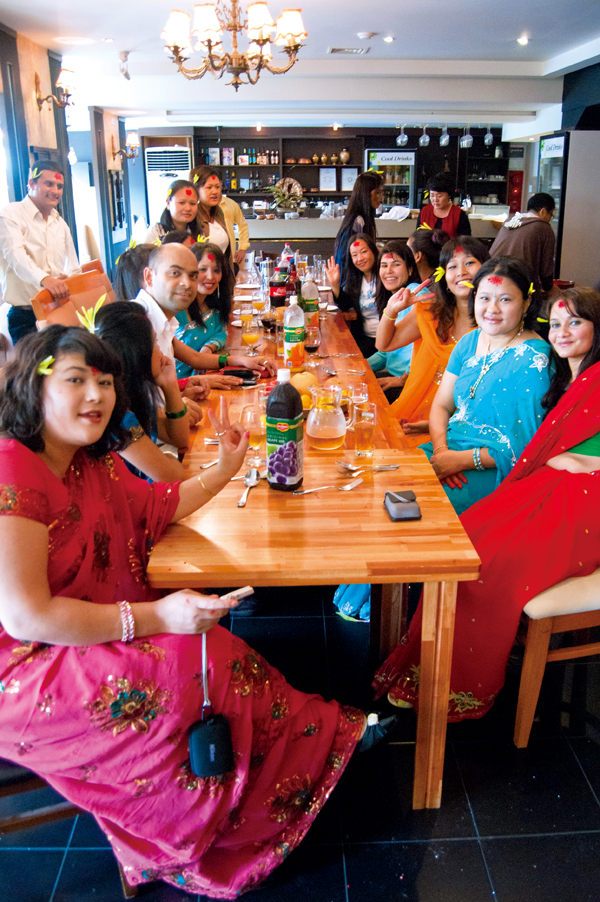| |
 |
|
| ▲ Photo By Yang Ho Geun |
Kamal Bishow Krma talks with a smile but it’s not a happy smile. It is the bitter smile of sorrow and discrimination.
Kamal, who is Nepalese, has been a restaurateur on Jeju Island since 2005. However, when he went to buy cell phones for the two Nepalese cooks he employs, the store rejected him, saying they can’t guarantee them because they are foreigners.
“These days, young boys even have cell phones, but I can’t understand why we can’t buy our own. I think that’s why they are prejudiced against immigrants. In the case of defaulting on phone charges, it’s not a problem of nationality but of personality.”
“Koreans are also foreigners when they go abroad,” he said. “Koreans are very upset if they are treated [with discrimination]. They all feel the same.”
Kamal studied Japanese cuisine at a cooking school in Tokyo from 1996 to 2002, and is fluent in Japanese and Korean. He met his Korean wife who was born on Jeju, Lee Hyun Sim, while working a part time job at a Tokyo restaurant. In 2004, they went to Nepal so Lee could be formally introduced to Kamal’s parents and then settled on Jeju Island from September of the same year. They have two sons, Chrisna, 4, and 1-year-old, Anbes.
His first year in Jeju had been hard because it was so difficult to find a job. The red tape surrounding foreigner employees had discouraged companies from hiring migrant workers. He opened his Japanese restaurant in 2005 but found business lackluster. The neighbors recommended that he open an Indian restaurant so he took their advice and opened Rajmahal, in June, 2009.
“Actually, I considered that I would open my Indian restaurant on Jeju first. But I couldn’t guarantee the success of my restaurant because I worried whether Koreans liked Indian food or not. But now many Koreans, Americans, Indians and Nepalis are visiting my restaurant.”
Lee said, “I was surprised Nepalis are increasing now. In this year, many Nepalese women married Korean man.”
According to provincial government statistics, as of February 2010, 22 Nepalis live on the island, including six workers and 12 women married to Koreans.
Lee said, “We help Jeju provincial government to interpret for Nepalese women married to Koreans. Nepalese women now enjoy their life in our restaurant.”
Rajmahal is a holy ground for Nepalis. The biggest festival of Nepal, Dashain, is held for 15 days in October. Twenty Nepalis gathered together at the restaurant on Oct. 19 to celebrate.
At Jeju National University the president of the Jeju International Students Organization is Kumaravelu Nandeesh Kumar, a 24-year-old Indian student studying a master’s degree in Electrical Engineering.
“Nice to meet you, I’m so happy because I made one Korean friend. You are my friend now, right?” said the cheerful and confident president who only came to Jeju in September of last year.
“Maybe I think 500 students are in JISO. Actually, it’s the majority of all Chinese. More than 200,” he said. “We have a meeting twice a month and discuss some issues what to conduct, how to conduct, and when to conduct. Sometimes we have some recreation type of games.”
He graduated from Anna University in India. His brother’s friend who is working in Jeju and doing a Ph.D. suggested that he come to Jeju to study.
“I thought Jeju is a good place to study. I’m recommending someone in India to come to Korea. I tell them it’s a good place to live. It’s fun, cool, no pollution, people are good.”
According to provincial government statistics, as of February 2010, 15 Indians live on the island, including four workers and nine foreign students from India.
“Many people in India, they don’t know much about Korea,” he said, citing language barriers and the difficulty of getting here. “For example, if he’s a worker in India at an IT company, so his company allows him to go to Korea. If not, it’s difficult to get a visa to come here and find a job.”
He also encourages his Jeju friends to visit India.
“[On national holidays] we prepare some Indian food and we will eat together,” he said. “Korean friends are very interested in India. So I used to tell them people are like this, we eat with hands, just right hands. I used to cook my own food. I used to offer them Indian food. If you want to eat Indian food, I can make it for you.”
Nepalis and Indians actively lead the Asian community. Currently, there has been a growing trend of Nepalis and Indians visiting Jeju for travel with some now considering the Island as their second home. Though few in numbers, those that reside here have an important role in helping the Jeju government translate important documents and by promoting these very different countries to one another. It is in the provincial government’s best interest to utilize those who have decided to plant roots on this tiny island to establish a human network, through understanding and cooperation, if they truly intend to convert Jeju into a truly “International Island.”
[Editor’s note: In fact checking this story, we sent one of our reporters to two of the big carriers’ retail stores to ask if a Nepali chef would be able to buy a cellphone in his or her own name. We were told by both companies that in making their eligibility assessment, the visa is more important than nationality, and that a visa of less than a year would require a large deposit. It was also revealed that there is a provision in the company guidelines that allows for the refusal of service to foreigners. In a follow up interview with Kamal, he said he has since purchased the cellphones in his own name and given them to his staff.]
Transcription and additional reporting by Chris J. Park
|




















